Hello! I’m Mark Olsen. Welcome to another edition of your regular field guide to a world of Only Good Movies.
This has turned into one of those weeks when there are just way too many movies opening. From titles that premiered earlier in the year, to films that popped up only recently, distributors have decided that today is the time to drop them in theaters. It can make for some tough calls as a moviegoer but hopefully ones with pleasant returns. Here’s some intel.
Mary Bronstein’s “If I Had Legs I’d Kick You” was a standout at Sundance in January and remains one of the most powerful films of the year. Rose Byrne gives a knockout performance as Linda, a mother struggling to hold onto her own unraveling sense of self as she cares for her ill daughter.

Rose Byrne in the movie “If I Had Legs I’d Kick You.”
(Logan White / A24)
In his review Glenn Whipp said, “Linda makes dozens of bad decisions in ‘If I Had Legs I’d Kick You,’ many of them seemingly indefensible until you realize that just how utterly isolated she feels. … Bronstein demands you pay attention to her, and with Byrne diving headfirst into the character’s harrowing panic, you will find you have no other choice.”
Speaking to Esther Zuckerman for a wide-ranging feature, Byrne said of the part: “Anything dealing with motherhood and shame around motherhood, whether it’s disappointment, failure — she’s got this line in the movie, ‘I wasn’t meant to do this’ — these are pretty radical things to say. People aren’t comfortable with that. So performance-wise, that was the hardest part because it was like a tightrope, the tightrope of this woman.”
Another Sundance premiere hitting theaters this week is director Bill Condon’s adaptation of “Kiss of the Spider Woman,” starring Diego Luna, Tonatiuh and Jennifer Lopez. Already a novel, a movie and a Broadway show, the story involves two men imprisoned in an Argentine jail for political crimes during the 1980s, with Lopez playing a fantasy film star who exists in their imaginations — a reverie to which they can escape.
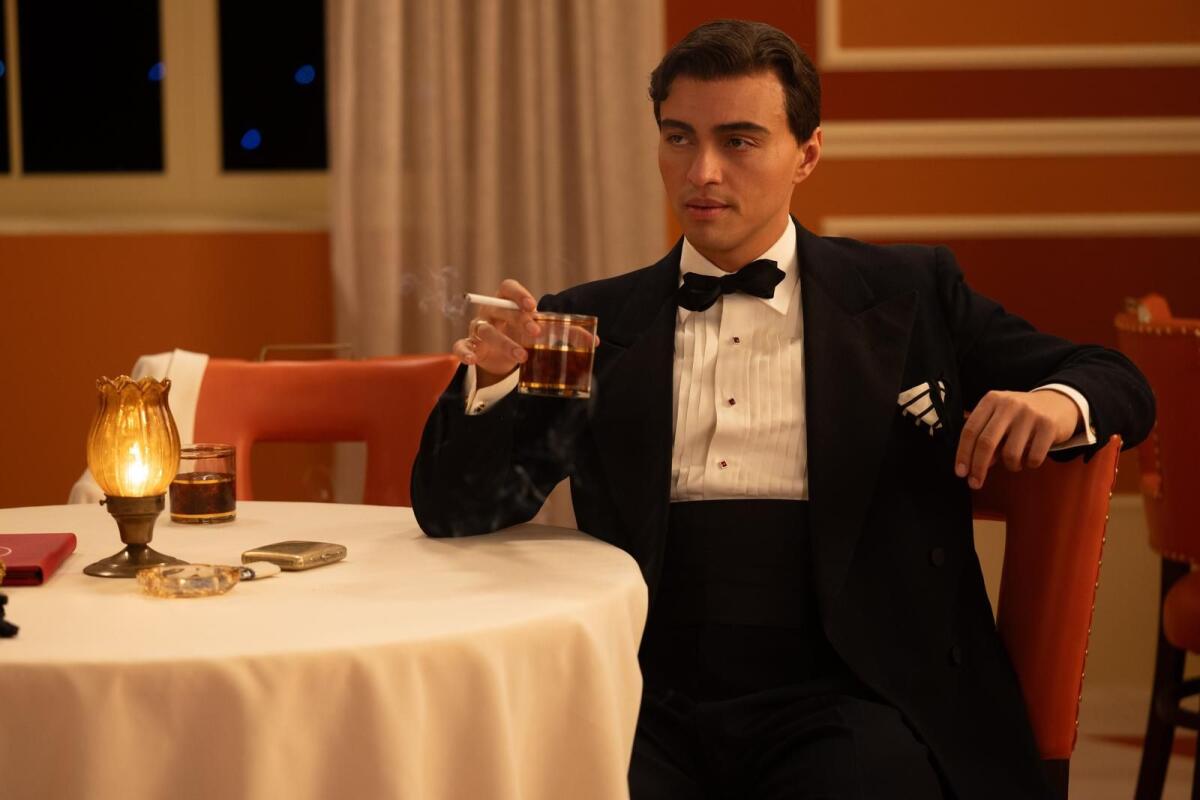
Tonatiuh in the movie “Kiss of the Spider Woman.”
(Roadside Attractions)
For our fall preview, Carlos Aguilar spoke to Tonatiuh, a native of L.A.’s Boyle Heights, whose performance is a true breakout.
“When I first met Jennifer, I was like, ‘Oh, my God — that’s Jennifer Lopez. What the hell?’ ” he recalled, with the enthusiasm of a true fan. “I must have turned left on the wrong street because now I’m standing in front of her. How did this happen? What life am I living?”
After praising both Lopez and Tonatiuh in her review of the film, Amy Nicholson wrote, “Still, my favorite performance has to be Luna’s, whose Valentin is at once strong and vulnerable, like a mutt attempting to fend off a bear. He’s the only one who doesn’t need to prove he’s a great actor, yet he feels like a revelation. Watching him gradually turn tender sends tingles through your heartstrings.”
Among the other new releases this week is “Urchin,” the directing debut from Harris Dickinson, and the documentary “Orwell: 2+2=5,” directed by Raoul Peck. There’s also Derek Cianfrance’s true-crime comedy “Roofman,” Kathryn Bigelow’s nuclear-war thriller “A House of Dynamite” and Luca Guadagnino’s campus-set cancel culture drama “After the Hunt.”
Rebecca Miller retro and ‘Mr. Scorsese’

Robert De Niro, left, and Martin Scorsese in an undated photo from Rebecca Miller’s documentary series “Mr. Scorsese.”
(Apple TV+)
The American Cinematheque is celebrating filmmaker Rebecca Miller this weekend with a four-title retrospective plus a preview of her documentary series “Mr. Scorsese,” a five-part portrait of the life and career of Martin Scorsese.
Miller will introduce a Saturday screening of her 2023 rom-com “She Came to Me,” starring Anne Hathaway and Peter Dinklage, then do a Q&A for the first two episodes of the Scorsese project on Sunday. Also screening in the series will be 2016’s “Maggie’s Plan,” starring Julianne Moore, Ethan Hawke and Greta Gerwig; Miller’s 2002 Sundance grand jury prize winner “Personal Velocity”; and 2005’s “The Ballad of Jack and Rose,” starring Miller’s husband Daniel Day-Lewis, screening with an introduction from co-star Camilla Belle.
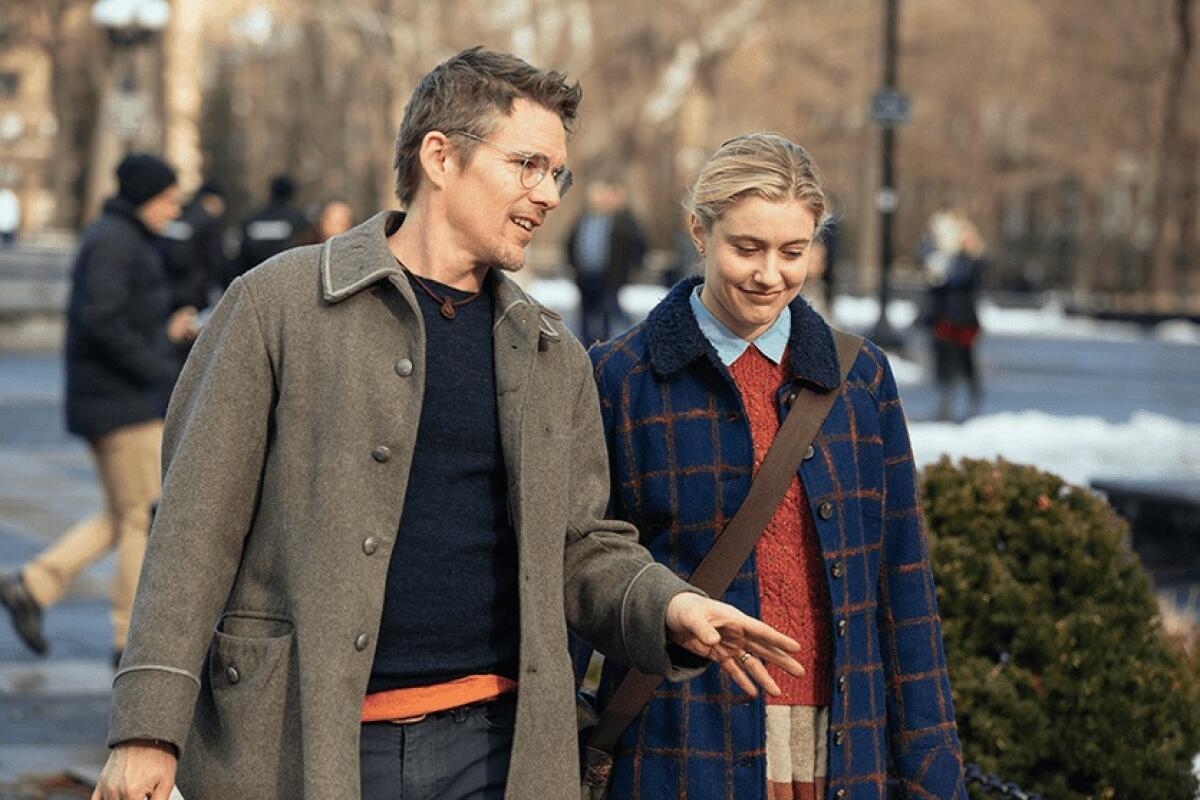
Ethan Hawke and Greta Gerwig in “Maggie’s Plan,” written and directed by Rebecca Miller.
(Sony Pictures Classics)
I spoke to Miller this week about the retrospective and her new Scorsese project, which premieres Oct. 17 on Apple TV+. Along with extensive interviews with Scorsese himself, the series includes insights from collaborators such as Robert De Niro, Paul Schrader and longtime editor Thelma Schoonmaker as well as childhood friends, Scorsese’s children, ex-wives and fellow filmmakers such as Steven Spielberg, Brian De Palma, Ari Aster, Benny Safdie and Spike Lee.
“It feels like such an honor and so weird in a way,” said Miller of the notion of having a retrospective. “You feel like you’re just in the middle of making everything, but then you realize, no, I’ve been making these films for 30 years. And it’ll be really interesting to see how the films play now for people. It’s exciting to have them still be sort of alive.”
When you look back on your own movies, what comes to mind for you?
Funnily enough, there is a connection between “Personal Velocity” and Martin Scorsese, which is that when I was about to shoot personal “Velocity,” I was in Rome, on the set of “Gangs of New York,” and I was watching the snack trolley go by and thinking my entire budget is probably the same as their snack budget. And thinking: What am I doing? What was I thinking? How am I going to do this? But talking to [“Gangs” cinematographer] Michael Ballhaus, I told him how long we had to shoot everything, and he said, “Oh, I envy you. We shot ‘The Bitter Tears of Petra von Kant’ in 10 days.” He was looking back on his days with Fassbinder as the good old days.
Then Marty gave me some advice on films with voiceovers to watch, and he ended up watching “Personal Velocity.” It was the first of my films that he saw, which then led probably to this [doc series] because he knew my films quite well. He watched them as time went on.
What interested you in Scorsese as a subject?
I knew that he was Catholic, that there was a strong spiritual element to his films. But I was interested in how that Catholicism kind of jogged with his fascination, or apparent fascination, with violence. Who is that person? How do those two things go together? And I thought that could be part of my exploration. I had a sense that all his work has a spiritual undercurrent in it, which I think it does. And I think that’s one of the things that I try to explore in the documentary. I felt I had something a little bit different to offer, for that reason.
The big questions that he’s asking: Are we essentially good? Are we essentially evil? And his immense honesty with himself about who he really is, the darkness of his own soul. I don’t think that people are usually that honest with themselves. And you realize that part of his greatness has to do with his willingness to look at himself.
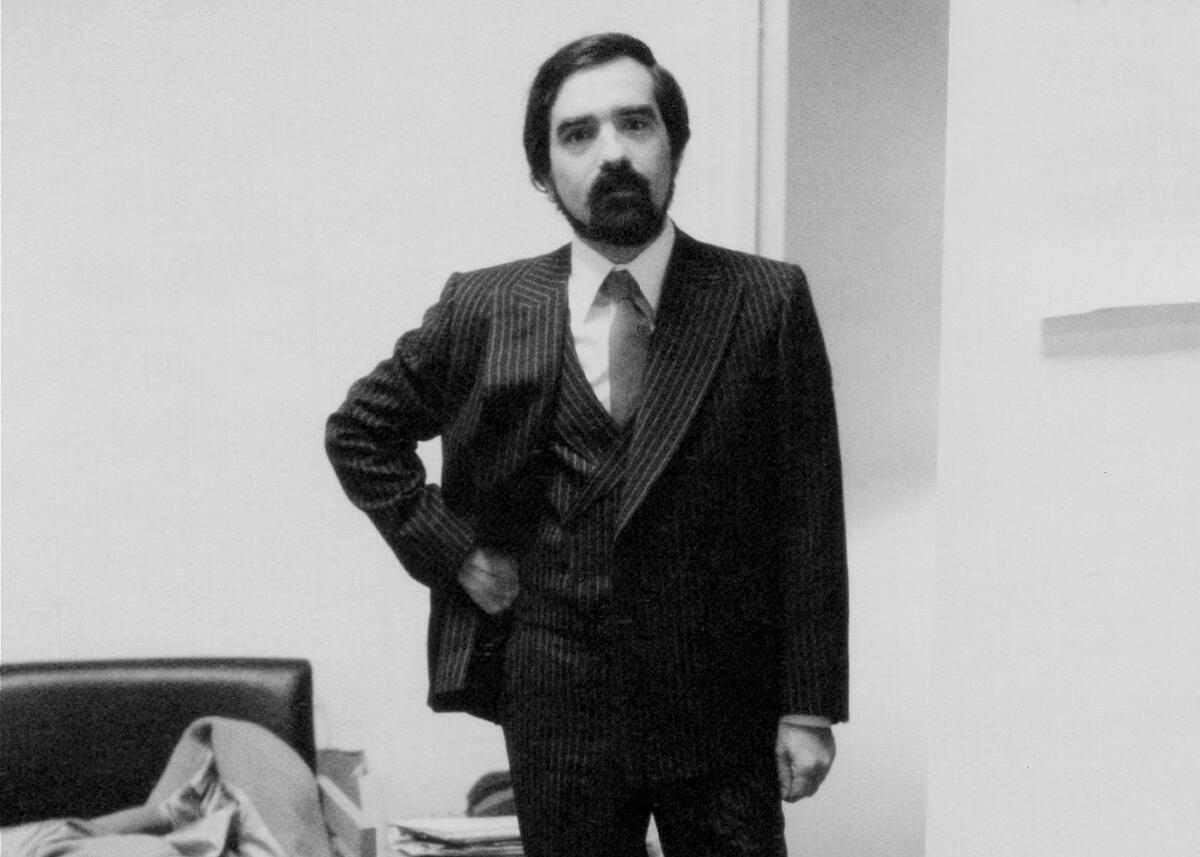
Martin Scorsese in an undated photo from Rebecca Miller’s documentary series “Mr. Scorsese.”
(Apple TV+)
As much as we think we know about Scorsese, he seemed so candid about some of the darkest moments of his life, especially when he talks about his drug overdose and hospitalization in the late 1970s or about some of his issues with Hollywood, especially around “The Last Temptation of Christ.” Were you ever surprised that he was so willing to go there with you?
Oh, yeah, I was. I really didn’t know what to expect. I didn’t have an agenda. I had the scaffolding of the films themselves and a strong sense that this was a man that you can’t separate from the films. So the thing is like a dance, it’s like a permanent tango between those two things. You’re not going to pry them apart. I didn’t know about the addiction. I didn’t know a lot of these things. My questions are totally genuine, there’s no manipulation. It’s all me. I was very prepared in terms of the films. But in terms of the chronology and the connective tissue of his life, I was really right there discovering it.

Martin Scorsese at work on his film “Killers of the Flower Moon,” as seen in Rebecca Miller’s documenary series “Mr. Scorsese.”
(Apple TV+)
You’re catching him such a remarkable point in his life and career. He seems very happy and settled in his personal life and yet he still makes something like “Killers of the Flower Moon,” full of passion and fire. What do you make of that?
[Screenwriter] Jay [Cocks] says he’s learned that he can be selfish in his art, but he doesn’t have to be selfish in his life. Even if your outside is regular, your inside can be boiling. And I think Marty’s inside is always going to be boiling. The seas are not calm in there and never will be.
‘They Live’ and ‘Josie and the Pussycats,’ together at last
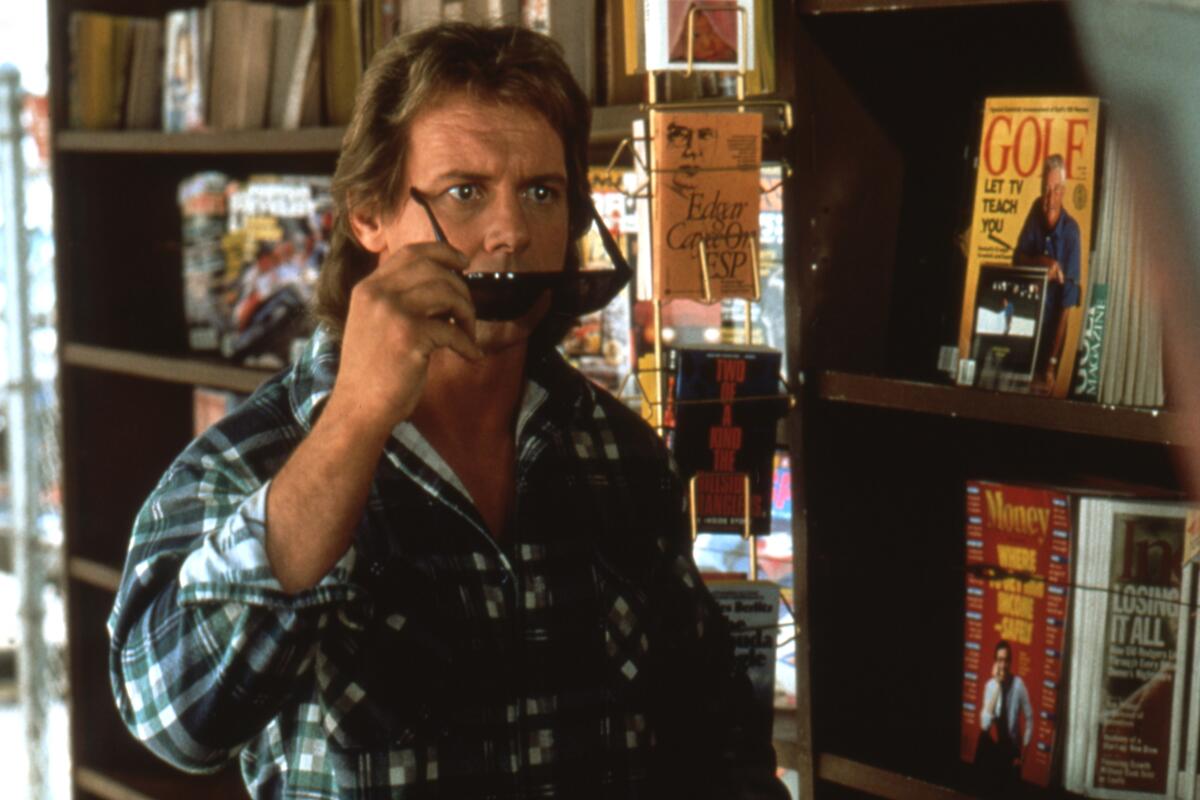
Roddy Piper in John Carpenter’s 1988 thriller “They Live.”
(Sunset Boulevard / Corbis )
There’s a real art to putting together a double bill. Sure, you can just program movies that have the same director or share the same on-screen talent. But what about deep, thematic links that might not otherwise be noticed?
The New Beverly has put together an inspired double bill playing on Friday, Saturday and Sunday of John Carpenter’s 1988 “They Live” and Deborah Kaplan and Harry Elfont’s 2001 “Josie and the Pussycats.” Though one is a rough-and-tumble sci-fi action picture and the other a satirical teen-pop fantasia, they both use the idea of subliminal messages to explore how consumer culture can be a means of control.
In “They Live,” wrestler-turned-actor “Rowdy” Roddy Piper plays a drifter who lands in Los Angeles and discovers a secret network fighting against an invasion of aliens living among us.
In Michael Wilmington’s original review, after joking the movie could be called “Invasion of the Space Yuppies,” he adds, “You can forgive the movie everything because of the sheer nasty pizzazz of its central concept. … The movie daffily mixes up the paranoia of the Red Scare monster movies of the ’50’s with a different kind of nightmare: the radical’s belief that everything is tightly controlled by a small, malicious ruling elite. Everything — the flat lighting, the crazily protracted action scenes, the monolithic beat and vamp of the score — reinforces a mood of murderous persecution mania.”
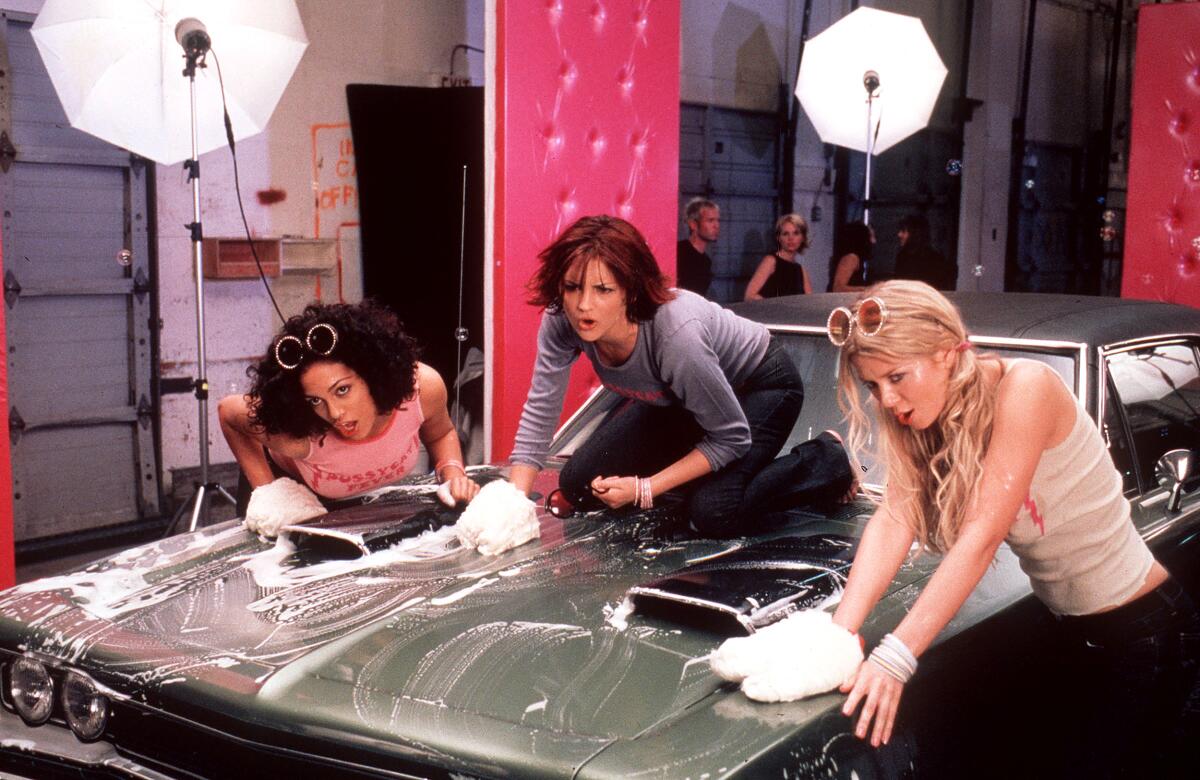
Rosario Dawson, from left, Rachael Leigh Cook and Tara Reid in the movie “Josie and the Pussycats.”
(Joseph Lederer / Universal Studios)
In “Josie and the Pussycats,” a small-town rock ‘n’ roll band (Rachael Leigh Cook, Tara Reid and Rosario Dawson) are plucked from obscurity when they are signed to a major record label and all their dreams of stardom seem to come true. But they come to realize the company’s executives (a brilliant pairing of Parker Posey and Allan Cumming) are using them for their own nefarious purposes.
Aside from some very hummable songs, the film has a truly epic amount of corporate logos and branding that appears throughout. Many reviewers at the time brought this up, including the L.A. Times’ own Kenneth Turan, who noted, “It’s a potent reminder that no matter how innocent a film may seem, there’s a Hollywood cash register behind almost every frame.” In subsequent interviews, Kaplan and Elfont confirmed these were not instances of paid product placement and, in fact, the production had to fight to get them all on-screen.
Points of interest
‘Eight Men Out’ in 35mm
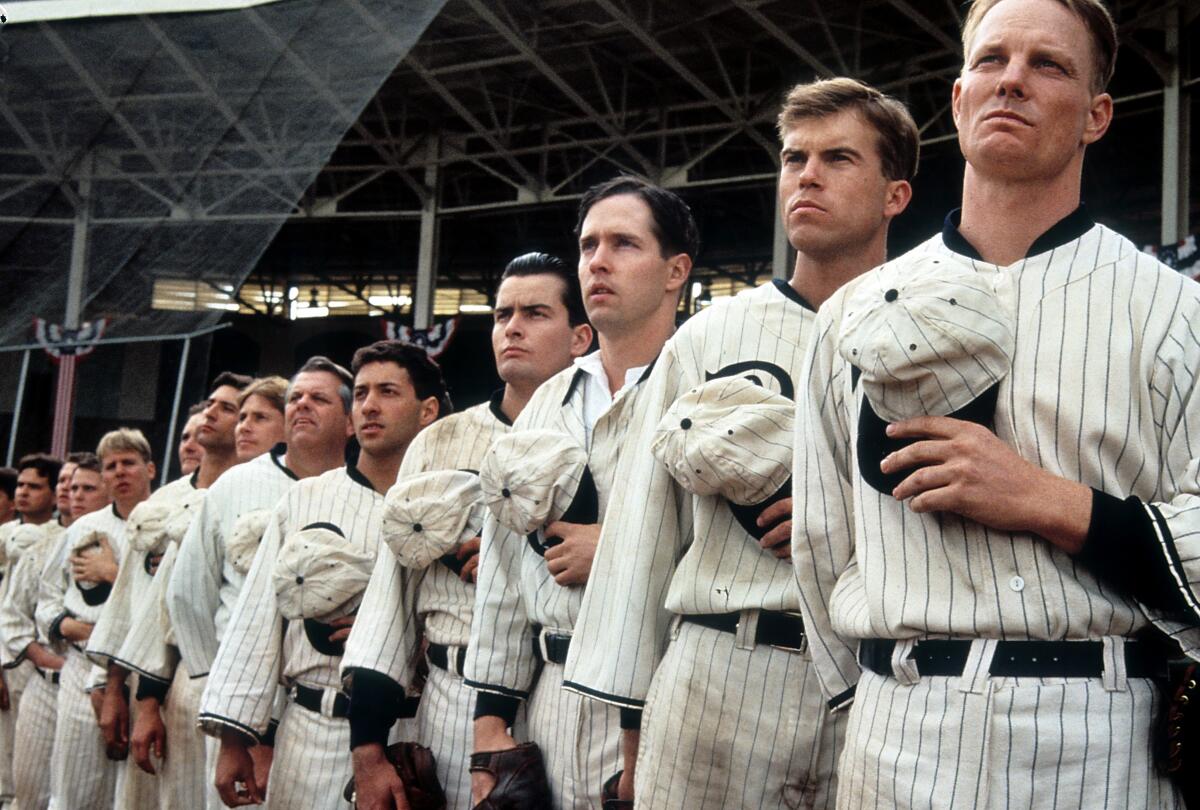
Charlie Sheen, center, in a scene from the film “Eight Men Out.”
(Archive Photos / Getty Images)
Writer-director John Sayles has been so consistently good for so long that it is easy to take his work for granted. Case in point: 1988’s “Eight Men Out,” which tells the story of the infamous “Black Sox” scandal, when players from the Chicago White Sox were accused of intentionally throwing the 1919 World Series in league with underworld gamblers. The movie is playing on Sunday at Vidiots in 35mm.
The film captures much of what makes Sayles so special, particularly his unique grasp of the interplay between social and economic dynamics — a sense of how things work and why. He also fully grasps the deeper implications of the forces of greed and money setting themselves upon such an unassailable symbol of wholesome Americana as baseball. It’s also what makes the movie particularly worth a revisit now. With a phenomenal cast that includes John Cusack, David Straithairn, D.B. Sweeney, Charlie Sheen, John Mahoney, Christopher Lloyd, Michael Lerner and Sayles himself, the film was a relatively early effort from cinematographer Robert Richardson, who would go on to work repeatedly with Martin Scorsese and Quentin Tarantino.
In a review at the time, Sheila Benson wrote, “ ‘Eight Men Out’ is not a bad movie for an election year. Everything that politicians cherish as ‘old-fashioned’ and ‘American’ is here. The Grand Old Game. Idealistic little kids. Straw hats and cat’s-whisker crystal sets. And under the slogans and the platitudes, a terrifying erosion and no one to answer for it. No wonder Sayles, hardly an unpolitical animal, found it such a relevant story nearly 70 years later.”
‘The Sound of Music’ in 70mm
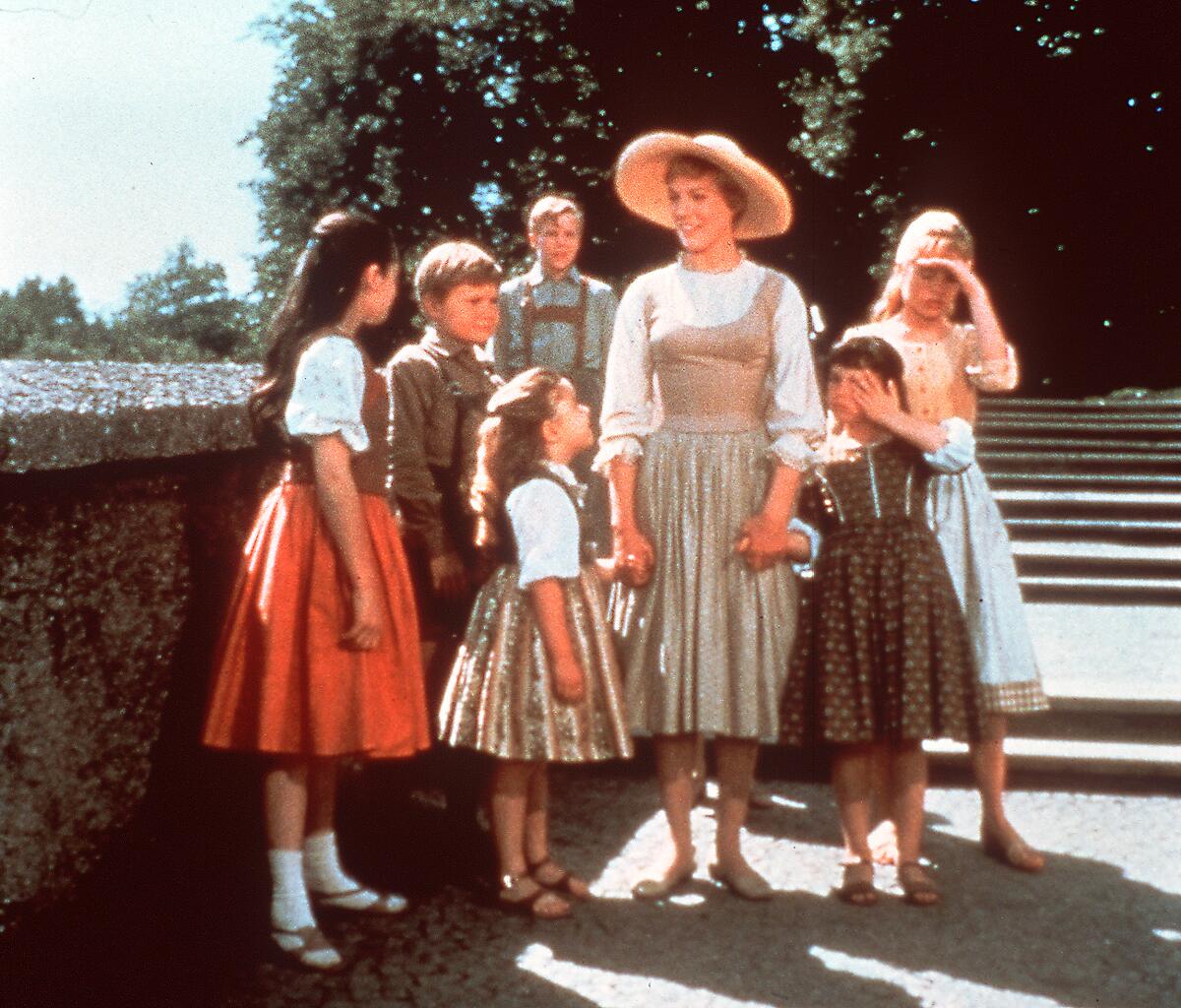
Julie Andrews, center, in the 1965 musical “The Sound of Music.”
(20th Century-Fox)
On Sunday the Academy Museum will screen Robert Wise’s “The Sound of Music” in 70mm, a rare opportunity to see this classic in the premium format on which it was originally released. Based on the stage musical by Rodgers and Hammerstein , the film would eventually win five Oscars, including director and best picture.
Starring Julie Andrews and Christopher Plummer, it’s the story of the singing Von Trapp family, eventually forced to flee their native Austria as the Nazis take power.
In a Times review from March 1965, Philip K. Scheuer wrote of Wise and his collaborators, “They have taken this sweet, sometimes saccharine and structurally slight story of the Von Trapp Family Singers and transformed it into close to three hours of visual and vocal broilliaance, all in the universal terms of cinema. They have invested it with new delights and even a sense of depth in human relationships — not to mention the swooning beauty of Salzburg and the Austrian Alps, which the stage, of course, could only suggest.”
Even notorious gossip columnist Hedda Hopper liked the movie, presciently writing, “The picture is superb — dramatically, musically, cinematically. Julie Andrews and Christopher Plummer were born for their roles. … All children — from 7 to 90 — wil love it. The following morning I woke up singing. Producer-director Bob Wise did a magnificent job and 20th [Century Fox] will hear nothing but the sound of money for years to come.”
